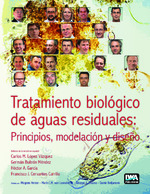Tratamiento biológico de aguas residuales
principios, modelación y diseño
Contributor(s)
A. Hernández García, H. (editor)
Buitrón Méndez, G. (editor)
M. Lopez-Vazquez, C. (editor)
J. Cervantes Carrillo, F. (editor)
Language
Spanish; CastilianAbstract
Over the past twenty years, the knowledge and understanding of wastewater treatment has advanced extensively and moved away from empirically based approaches to a fundamentally-based first principles approach embracing chemistry, microbiology, and physical and bioprocess engineering, often involving experimental laboratory work and techniques. Many of these experimental methods and techniques have matured to the degree that they have been accepted as reliable tools in wastewater treatment research and practice. For sector professionals, especially a new generation of young scientists and engineers entering the wastewater treatment profession, the quantity, complexity and diversity of these new developments can be overwhelming, particularly in developing countries where access to advanced level laboratory courses in wastewater treatment is not readily available. In addition, information on innovative experimental methods is scattered across scientific literature and only partially available in the form of textbooks or guidelines. This book seeks to address these deficiencies. It assembles and integrates the innovative experimental methods developed by research groups and practitioners around the world. Experimental Methods in Wastewater Treatment forms part of the internet-based curriculum in wastewater treatment at UNESCO-IHE and, as such, may also be used together with video records of experimental methods performed and narrated by the authors including guidelines on what to do and what not to do. The book is written for undergraduate and postgraduate students, researchers, laboratory staff, plant operators, consultants, and other sector professionals. En las últimas decadas, el conocimiento y entendimiento del tratamiento de aguas residuales ha avanzado extensamente evolucionando de enfoques basados en procedimientos meramente empíricos a enfoques con principios básicos que abarcan la química, microbiología, física, ingeniería de procesos y matemáticas. La gran mayoría de estos avances han madurado a tal grado que han sido codificados en modelos matemáticos para su simulación en computadoras. Para una nueva generación de jóvenes científicos e ingenieros que ingresan al área del tratamiento de aguas residuales, la cantidad, complejidad y diversidad de estos nuevos desarrollos puede ser abrumador, particularmente en países en vías de desarrollo donde no existe un fácil acceso a cursos avanzados de postgrado en tratamientos de aguas residuales. Este libro tiene como objetivo resolver esta deficiencia ya que compila e integra el material de diversos cursos de postgrado de más de una docena de grupos de investigación de todo el mundo que han hecho contribuciones significativas para el desarrollo del tratamiento de aguas residuales.
Cabe resaltar que la edición en inglés del presente libro, forma parte de un plan de estudios en tratamiento biológico de aguas residuales que incluye:
• Resúmenes de las presentaciones y clases de los temas cubiertos en el libro
• Videos de las clases de los profesores autores de los capítulos del libro
• Ejercicios de auto-aprendizaje para los participantes en los cursos
Al término del plan de estudios antes mencionado, los últimos avances en modelación y simulación de la operación y diseño de los sistemas de tratamiento de aguas residuales (ya sean lodos activados, procesos de remoción biológica de nitrógeno y fósforo, clarificadores secundarios o sistemas de biopelículas) pueden ser abordados con mayor profundidad, conocimientos más avanzados y mayor confianza."
Keywords
wastewater treatment; aguas residuales; tratamiento biológico; experimental methods; TextbookDOI
10.2166/9781780409146ISBN
9781780409146OCN
1030817152Publisher
IWA PublishingPublisher website
https://www.iwapublishing.com/Publication date and place
2017Classification
Industrial applications of scientific research and technological innovation
Water supply and treatment


 Download
Download Web Shop
Web Shop